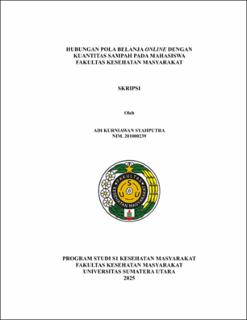| dc.description.abstract | Waste continues to be a pervasive national concern, as exemplified by the substantial
accumulation of inadequately managed waste in Medan City, which generated 628.7
thousand tons in 2022. The predominant source of waste in Indonesia is household
waste. The proliferation of online shopping, particularly among students, has emerged
as a significant contributing factor to the escalating waste burden. The types of waste
resulting from online shopping include single-use plastics and cardboard. The
objective of this study is to examine the correlation between online shopping patterns
and the volume of waste among students of the Faculty of Public Health in 2024. This
analytical survey study employs a cross-sectional research design, and the research
was conducted at the University of North Sumatra. The population of this study consists
of 361 students from the Faculty of Public Health Class of 2022, with a sample size of
78 students. The analysis was conducted in two stages: univariate analysis with
frequency distribution and bivariate analysis with chi square test, using a confidence
level of 95% (α = 0.05). The results indicated an absence of a relationship between
student characteristics, specifically gender (p = 0.394), and living expenses (p =
0.765). However, a significant relationship was observed between online shopping
patterns, influenced by online shopping costs (p = 0.001), and the frequency of online
shopping (p= 0.001), and no significant relationship was found between online
shopping patterns based on the type of online shopping (p = 0.091), student knowledge
(p = 0.450), and student attitudes (p = 1.000) with the quantity of waste. The study's
findings suggest that parents should be attentive to their family's technological
advancements, particularly in online shopping, and that students should be mindful of
their online shopping patterns and the associated waste management practices. | en_US |


